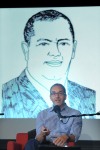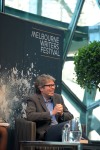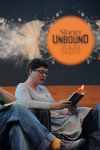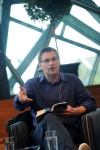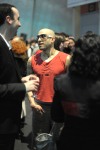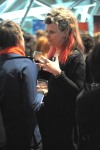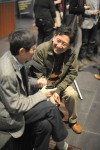Blog Archives
On the unfamiliarity of home
When I was 18, I moved to Poland. It wasn’t the first time in my life that I’d spent a significant amount of time away from Melbourne but it was the first time I’d left without my family. I grew up in the middle-class inner south-east, and spent a lot of my childhood years in around Brighton, Caulfield and Moorabbin, somewhere on the bus lines between Chadstone Shopping Centre and Southland. Trips to the CBD were rare until I got old enough to go nightclubbing, at which point I found the bright lights of the skyscrapers, the honking of car horns, the late night the rattle of trams a balm for whatever late-teen angst I still harboured.
When I moved overseas, however, I felt like I’d lost something. The familiarity of the streetscapes, the rhythmic rocking of the Frankston train, the unpredictable splashes of sunlight and even the graffiti in the city alleys – all of this had been like an anchor for me, but I had never really noticed it as such. Met with the stripped facades of the old communist-era buildings, filthy snow on the Wałbrzych roads, and the bitter cold of the Polish winter wind, I started looking back home again, seeing it clearly, I felt, for the first time. Perhaps that realisation that you know nothing at all about your own city, your own country, is jarring for everyone. For me, faced with such new landscapes, the fact that I knew nothing about the origins of that place I called home made me feel ashamed.
It’s a strange relationship that people have with places. That idea of ownership – of allocating segments of concrete and dirt and air – is baffling on so many levels and yet so much of our lives is controlled by the administration of property, by the occupation of it, the purchasing of it – or the stealing of it. By the struggle for control over objects, over our own space, over that of other people. The places we grow up in shape us so much and yet so often we wander through them glaze-eyed, myopic, only half awake.
Or perhaps I’m just talking about myself. 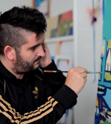
In any case, there’s nothing quite like having your eyes opened to those familiar places, gazing on them anew, rediscovering them, or finding hidden parts of them for the first time. There are nine different walks around Melbourne happening as part of MWF2012, and all of them represent a unique opportunity for you to get to know more about this history-rich, fascinating and complicated city:
- Melbourne’s Bohemia with Tony Moore
- When We Think About Melbourne with Jenny Sinclair
- JJ Clark and the Australian Renaissance with Andrew Dodd
- The Natural Origins of Melbourne with Dr Gary Presland
- Melbourne’s Street Art Tours with various local street artists
- Finding Melbourne’s Heart and Soul with Sophie Cunningham
- Street Fashion with Badaude
And the always popular:
- Melbourne’s Hidden Dragons with Carole Wilkinson
- Eclectic Bookshops (East) and Eclectic Bookshops (West) with Shelley Cohney
For extra dates and times other than those linked direct above, please see the full list of Food, Wine and Walks events.
Uncomfortable truths: gender matters
Women continue to be marginalised in our culture. Their words are deemed less interesting, less knowledgeable, less well-formed, less worldly and less worthy.
If you are in any doubt that gender matters, you need only ask a scientist. Yesterday in ACMI Cinema 2, Robert Brooks, Cordelia Fine and Jane McCredie got together to discuss with Monica Dux the science of sex differences. Fine spoke first. ‘We have a tendency to see male and female as fixed and immovable categories,’ she said. Neurology and biology are called upon and expected to explain existing sexual power differentials, achievement biases, social norms and gender stereotypes. But it’s important to critique this ‘sexist science’, Fine said, because – as she writes in Delusions of Gender – ‘from the seeds of scientific speculation grow the monstrous fictions of popular writers.’ Self-help books and the popular media capitalise on these categories and trends, and refer to ‘the science’ as justification for the status quo.
 Brooks picked up where Fine left off. ‘Male and female are seldom as different as we would like to think,’ he said, and nature v. nurture is a false dichotomy. Yes, to understand power and the inequalities of existing power structures, we need to look at the social, political and economic contexts that created them. But this is not incompatible with evolutionary biology. In fact, Brooks argued, engaging with evolutionary biology is essential to understanding the implications those very same forces might have for individual people.
Brooks picked up where Fine left off. ‘Male and female are seldom as different as we would like to think,’ he said, and nature v. nurture is a false dichotomy. Yes, to understand power and the inequalities of existing power structures, we need to look at the social, political and economic contexts that created them. But this is not incompatible with evolutionary biology. In fact, Brooks argued, engaging with evolutionary biology is essential to understanding the implications those very same forces might have for individual people.
When Jane McCredie spoke, she said she said she found it frustrating how science, in seeking to make everything precise, sought to find clear categories in which to place people. For instance, we could dismiss trans and intersex people as aberrations of type, she said, but to do so would be a failure of nerve. Nobody fits a category unequivocally. Science needs to accomodate all of our differences, not seek to push them back into a pre-existing, restrictive boxes.
It would have been difficult for anyone to come away from this session believing that scientific discourse is divorced from the politics of gender. But if you were in any doubt that there are social and political reasons to argue against this kind of sexism and all others besides, Sophie Cunningham’s A Long, Long Way To Go: Why We Still Need Feminism would have left you with the conviction that sexual inequality is indeed very real, and evident in statistic after sobering statistic. 
In Australia, Cunningham explained, only 58% of women are in the workforce, compared to 78% of men. Only 54% of ASX200 companies have women in management roles, and only 10.7% of executive managers are women. 56% of law graduates are women, but only 25% of practicing lawyers over 40 are women, and those women in law suffer a 62% pay gap. The arts are nowhere near exempt from these kind of telling numbers. When the May issue of Esquire listed 75 books every man should read, only one woman made the cut. The 2009 and 2011 Miles Franklin shortlists were all male. Since the award began in 1957, it has been awarded 51 times. Out of those 51 awards, only 13 recipients have been women. In theatre, visual and fine arts, these trends are mirrored, if not worse. And one set of numbers Cunningham didn’t give: in the 16 years since the MWF instituted an opening night keynote address, that headlining festival role has been occupied only twice by a woman – by the same woman: Germaine Greer.
So do these things matter? Cunningham asked. Are women just feeling left out? Earlier in the afternoon, when Fine discussed women’s performances in mathematics, she explained how women who believed that they were ‘naturally’ bad at mathematics performed badly. When they believed that they were bad at mathematics not through any deficiency of their own but because of external factors, their scores went up significantly. Cunningham argued a similar point: ‘Erasure of female talent… has a quantifiable effect on women’s careers and their capacity to earn money.’
Perhaps many of these biases are unconscious, Cunningham said. But if our biases are unconscious, that is no defence against failing to act on their recognition. It is in understanding this that Cunningham and a group of writers, editors and feminists created the Stella Prize for Australian women’s writing. But change is not just a matter of recognising what exists, but of creating a culture in which that is valued, and in which women are further able to access the means to pursue their vocations. Unconscious inequality requires conscious action to correct it. And because of this, a new wave of feminism, says Cunningham, ‘a fourth wave, if you will, is both needed and soon to arrive.’
To speak out and to listen
It is difficult for women in Australia to express a political opinion, let alone have that opinion taken seriously, because of the stigma that still surrounds their gender. For Islamic women these difficulties are further compounded, not only in the West where prejudice against Islam is rising, but also in Islamic countries where it may be physically dangerous to speak out at all, particularly when that involves condemnation of their own government and international military forces.
Malalai Joya is a former Afghan MP and outspoken activist against the Taliban, the Northern Alliance and the presence of allied forces in Afghanistan. During the Taliban regime, Joya worked underground to promote women’s health and education for girls. At age 23, she publicly denounced the presence of warlords and criminals at a constitutional assembly and was thrown out amid tremendous uproar. Two years later, in 2005, she was elected to parliament where she was repeatedly threatened and silenced every time she attempted to speak. She has received death threats and survived multiple assassination attempts.
A fierce critic of US foreign policy and presence in the region – and recently denied an entry visa to the US after speaking out against it – Joya is firm about her position that Afghanistan is occupied not for the greater good but for the purposes of power. Tens of thousands of Afghan people have been killed by allied forces, she says, predominantly via air strikes, most of them women and children. When the dominant voices in Australia on this country’s continued involvement in the occupation of Afghanistan are our own politicians, who for eleven years have been postulating that Allied forces in the region are for the benefit of all Afghan people, hearing the voices of women like Joya becomes even more important.
Malalai Joya will be speaking at two Melbourne Writers Festival events: Big Ideas: 10 years after 9/11 – Pakistan, Afghanistan and the Struggle for Democracy and The Pity of War: Afghanistan and Iraq where she will appear on a panel with Jeff Sparrow, John Martinkus and Karen Middleton. Joya’s appearance at the Melbourne Writers Festival is sponsored by Overland Literary Journal, the forthcoming edition of which features her in an extended interview. Overland 204 is being launched by Sophie Cunningham as part of the MWF on 27 August.
At the root
Every time I get into an emotional slump or an intellectually tricky spot, my friend Karen says to me, ‘Go back to your core texts.’
It’s a misleadingly studious-sounding and very arts-degree piece of advice, but it’s probably some of the best I’ve ever received because what she really means is: go back to those books, films, stories, songs and ideas that changed you, that sparked a new understanding in you, that helped you decide what it was you found really important.
 Perhaps the studious tone of the advice isn’t totally misplaced, because the first book I always go back to is Simone de Beauvoir’s The Second Sex. I came across it in my second year of uni, not through gender studies but through the philosophy department. I took a class on existentialism because I wanted to immerse myself in Sartre, but it was The Second Sex that eventually consumed me.
Perhaps the studious tone of the advice isn’t totally misplaced, because the first book I always go back to is Simone de Beauvoir’s The Second Sex. I came across it in my second year of uni, not through gender studies but through the philosophy department. I took a class on existentialism because I wanted to immerse myself in Sartre, but it was The Second Sex that eventually consumed me.
I found the book strange, startling and occasionally confusing, but every now and then a passage would resonate so strongly with my own experiences that it would lodge itself in the forefront of my consciousness, demanding I pay attention. Not being able to get it out of my head I would underline words, scribble notes in the margins, copy whole passages out onto paper just to make sure I’d processed them properly.
It was her discussion of the woman in love that knocked me about the most at the time:
Every woman in love recognises herself in Hans Andersen’s little mermaid who exchanged her fishtail for feminine legs through love and then found herself walking on needles and live coals.
I spent a lot of time kicking the football in party dresses as a kid (so to speak) and in my late teens I listened to a lot of Tori Amos because she gave voice, however cryptically, to a half-acknowledged set of instincts that were fundamentally frustrated by and yet still found themselves drawn to the aesthetics of traditional gender constructs.
and in the mist there she rides
and castles are burning in my heart
and as I twist I hold tight
and I ride to work
every morning wondering why
“sit in the chair and be good now”
and become all that they told you
I couldn’t say in all honesty that Beauvoir alone made me call myself a feminist. But if Amos’ songs prised open something inside me, Beauvoir put into tough, articulate sentences those feelings that I’d previously only ever expressed instinctively, or approached metaphorically through art or music.
At the 2010 MWF, one of the most rewarding and interesting panels I had the privilege to attend was ‘From Woolf to Wolf’. Sophie Cunningham, Monica Dux and Emily Maguire talked with MWF’s own Jo Case about feminist literature: Virginia Woolf’s A Room of One’s Own, Germaine Greer’s The Female Eunuch and Naomi Wolf’s The Beauty Myth respectively. It was heartening to see so many people of all ages at a session on feminist writing, but even more so to hear women talking about how those books – and many others besides – so profoundly influenced or changed them. And I remembered telling my mother about my experience reading The Second Sex. How it made me angry, afraid, astonished and excited all at once. She said she felt the same when, as an 18-year-old, she found Betty Friedan’s The Feminine Mystique. ‘Reading that book,’ she said, ‘was the first time I’d ever really thought: perhaps the world doesn’t have to be like this.’
Stories from every angle
So, another Melbourne Writers Festival winds to a close. It’s been that curious mixture of exhausting and energising, with heroes met and made.
Every festival organiser hopes for that magical combination of guests, which can elevate a decent hour’s chat into a wonderful interweaving of minds and ideas. My favourite panels saw this happen, particularly How Russia Changed My Life, featuring the charming Elif Batuman, intrepid memoirist Maria Tumarkin and the irrepressible historian Sheila Fitzpatrick; and From Woolf to Wolf, in which Sophie Cunningham, Monica Dux and Emily Maguire discussed Virginia Woolf, Naomi Wolf and Germaine Greer.
The festival hosted some international stars, including Joss Whedon and Norman Doidge, but often it’s the writers whose work 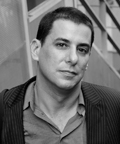 I’m less familiar with whose stories really affect and delight me. On Sunday, at Magazine, Jake Adelstein, whose book Tokyo Vice tells of how he faced intimidation from the yakuza, read from a deleted chapter of his book – a comic tale of trailing an escaped monkey around Tokyo’s Nishi-Azabu area and being outdone in journalistic prowess by a nine-year-old boy. But only the day before, Adelstein movingly told the packed audience at Feddish about the real and dangerous cost of opposing the yakuza.
I’m less familiar with whose stories really affect and delight me. On Sunday, at Magazine, Jake Adelstein, whose book Tokyo Vice tells of how he faced intimidation from the yakuza, read from a deleted chapter of his book – a comic tale of trailing an escaped monkey around Tokyo’s Nishi-Azabu area and being outdone in journalistic prowess by a nine-year-old boy. But only the day before, Adelstein movingly told the packed audience at Feddish about the real and dangerous cost of opposing the yakuza.
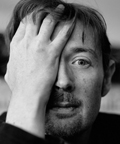 I loved the new venue, Feddish, where the Morning Fix sessions opened each festival day with a free smorgasbord of authors. But traditional venues continued to shine, including the Toff, which saw DBC Pierre settle back in a giant storytelling chair and artists including Clare Bowditch and Hannie Rayson re-enact Fleetwood Mac’s Rumours.
I loved the new venue, Feddish, where the Morning Fix sessions opened each festival day with a free smorgasbord of authors. But traditional venues continued to shine, including the Toff, which saw DBC Pierre settle back in a giant storytelling chair and artists including Clare Bowditch and Hannie Rayson re-enact Fleetwood Mac’s Rumours.
The parties, of course, were very good. The official opening party set the tone for a fun ten days, with the speeches including a tale of festival love and lust; and the celebration of Overland‘s 200th issue was attended by well-wishers and friends galore. A 25th birthday can never go past without at least a couple of good bashes, and at MWF’s 25th, Readings Books’ Mark Rubbo dropped by, as did Les Murray.
As a participant in the festival this year, too, I experienced many surprising and wonderful moments. During the Schools Program, I spoke with fantastic authors Gabrielle Wang, Kate Forsyth and Alice Pung; and inspiring youth leaders Chris Varney and Adam Smith. It’s so amazing to see how enthusiastic young festival-goers are about reading, books and ideas, and I have no doubt that we’ll see some of them back as guests in the future. During Kill Your Darlings‘ residency at Magazine, it was pretty wild to hear Robyn Archer sing every musical reference in her book Detritus – her live fifteen-minute snippet reel needed to be seen to be believed.
Congratulations to the fantastic festival staff and volunteers for a magnificent 2010 festival. I wish you all a good week’s sleep.
From Woolf to Wolf: Cunningham, Dux and Maguire on classic feminist texts
In Woolf to Wolf, Sophie Cunningham, Monica Dux and Emily Maguire came together to discuss three great works of literature. The venue was changed to accommodate the many people who wanted to celebrate these significant books, and we all crammed into the repurposed BMW Edge.
Cunningham was revisiting Virginia Woolf’s A Room of One’s Own, and noted first how much Woolf had contributed – not only to literature, but to the form of the book and life writing. Cunningham read one of Woolf’s famously semicoloned passages to show how unusual the prose itself is, and spoke spiritedly on how the book shows how when women were given the chance to write their stories, they wrote even the sentences themselves differently to anything else that appeared at the time. So, the book is more relevant than it should be today, with Cunningham mentioning particularly Woolf’s writing about a female’s need for an income and education – circumstances that, once filled, would mean ‘a huge rush of women’s words’. But Cunningham opined that women might actually be worse off now that we were 20 years ago: the intense scrutiny that women undergo is still relevant today. Being judged as a writer/a feminist writer a non-feminist writer/as a woman writer is ‘a painful and disabling thing’.
Monica Dux, co-author of The Great Feminist Denial, recently wrote an article in Kill Your Darlings about Germaine Greer’s 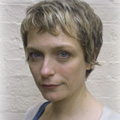 The Female Eunuch. Dux regretted that she wasn’t able to recount a great story of how when she first started menstruating, her mother gave her tampons and a copy of The Female Eunuch; or being handed it by an inspiring lecturer – but couldn’t remember when she first came across the seminal book. It’s a book that ‘floats about in a feminist ether’. Dux asked her friends if they had read the book, and about half confessed that they hadn’t. Yet the book is so strongly held in our consciousness – so strongly that people who haven’t read her work invoke her work or her name in the service of a feminist argument or ideal.
The Female Eunuch. Dux regretted that she wasn’t able to recount a great story of how when she first started menstruating, her mother gave her tampons and a copy of The Female Eunuch; or being handed it by an inspiring lecturer – but couldn’t remember when she first came across the seminal book. It’s a book that ‘floats about in a feminist ether’. Dux asked her friends if they had read the book, and about half confessed that they hadn’t. Yet the book is so strongly held in our consciousness – so strongly that people who haven’t read her work invoke her work or her name in the service of a feminist argument or ideal.
Nevertheless, the fact that Greer and The Female Eunuch are synonymous with feminism doesn’t mean that women have an uncomplicated relationship with her and the book. In fact, particularly in academic circles, the book was maligned or shunned. However, the book is continually cited by women as the book that ‘changed my life’. In attempting to answer why, Dux cited the bawdy, accessible prose, which set it apart from other contemporary works. In addition – while it held no concrete solutions – it was an inspiration. Further, Greer’s ‘refusal to go away or toe any party line’ has helped perpetuate an aura around the book. It helped unify women in their response to Louis Nowra’s article – which is a pretty good outcome from a feminist classic.
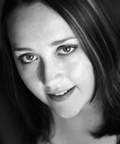 Emily Maguire is the author of Princesses and Pornstars. Secretly self-hating teenager. ‘slathering on self-disgust with every stroke of the make-up brush’. Someone gave Maguire a copy of The Beauty Myth to read, which she only read to keep up with her friends. When she finished it, though, she ‘felt like she’d been slapped’. While Maguire felt her life wasn’t changed immediately by Wolf’s book, it did tear away at the loathing she felt, for herself and other women.
Emily Maguire is the author of Princesses and Pornstars. Secretly self-hating teenager. ‘slathering on self-disgust with every stroke of the make-up brush’. Someone gave Maguire a copy of The Beauty Myth to read, which she only read to keep up with her friends. When she finished it, though, she ‘felt like she’d been slapped’. While Maguire felt her life wasn’t changed immediately by Wolf’s book, it did tear away at the loathing she felt, for herself and other women.
An interesting twist to Maguire’s relationship with the book was that, as her own feminism developed, she found herself disagreeing with as much of the book as she admired. When she was asked to interview Wolf earlier this year, she hesitated. Rediscovering the book in her preparation, however, Maguire felt ‘slapped in the face again’ – at the book’s passion and power.
Today, the beauty myth itself has mutated. Maguire cited the new ways in which all people – not just women – are subject to standards of beauty, with the increase in men’s eating disorders, botox and plastic surgery. This is why The Beauty Myth is a book, Maguire concluded, that we still need today.
Blogs about the 2009 Melbourne Writers Festival
It has been wonderful to see the flurry of online activity that this year’s festival has generated on this blog, on Facebook and on Twitter. However, there has also been an extraordinary amount of blogging done elsewhere by both MWF guests and visitors.
Here is a list of all the bloggers we could find who wrote about MWF during the festival. The writing collected here is diverse and ranges from event reviews, interviews, personal reflections, festival wrap-ups and humorous takes on the festival. There’s a lot of content here but we certainly had a great time pouring over it all (and noting the feedback!) so we’re sure you’ll enjoy it too.
Finally, we did our best to make contact with everybody who blogged about MWF this year but if we did miss you then apologies and please feel free to submit links to your blog in the comments.
Blogging from within:
Official MWF bloggers Estelle Tang and Frenchelbow (Simon Keck) here at mwfblog.com.au
Philip Hensher, whose novel The Northern Clemency was shortlisted for the 2008 Man Booker Prize, wrote about his visit to Melbourne for MWF here for the UK newspaper The Independent.
Zimbabwean writer Petina Gappah wrote this post on her personal blog about her visit to Melbourne as a MWF guest.
Festival guest Angela Meyer is the author of the LiteraryMinded blog and she kept an incredibly comprehensive online diary during the festival:
Part 1 | Part 2 | Part 3 | Part 4 | Part 5 | Part 6 | Part 7 | Part 8
Festival guests Jessica Au and Sophie Cunningham from Meanjin Quarterly wrote this piece about The Future of the Book session on Spike (Meanjin‘s blog).
Young adult and children’s fiction writer Julia Lawrinson blogs here on her Writing in the margins blog.
Artist Chay-Ya Clancy created the Federation Square word board installation, which so many of you had fun with. Chay-Ya did some behind the scenes blogging on her Stillness in flight blog.
MWF Copywriting intern Megan Burke covered MWF extensively throughout these posts on her Literary Life blog.
MWF related content from Readings, the festival’s official bookseller.
Blogging from without:
Freelance writer George Dunford covered the festival on his blog Hackpacker in the posts collected here.
On ANZ LitLovers LitBlog, the blog for the online reading group, Lisa Hill covered the festival on the posts collected here.
Perry Middlemiss, who has written online about Australian literature since 1996, filed these four reports on his Matilda blog.
Ghostlines author Nick Gadd wrote about MWF in these three pieces from his blog The writer in disguise.
Joyce Kwok, the author of the decisive guide to Melbourne Mel: Hot or Not, covered MWF in these posts.
Benjamin Solah, Marxist Horror Writer, covered MWF on these posts and a summary of those posts appears at The Specusphere.
Writer, reader and teacher Sherryl Clark filed these four reports on her Books and Writing blog.
Thuy Linh Nguyen wrote about MWF across these posts.
Kathryn Daley covered MWF in these posts on her A little bit of life blog.
Also check out:
Author Jon Bauer’s festival wrap-up
Planning With Kids on the Schools Program
Miscellaneous Adventures of an Aussie Mum on the MJ Hyland masterclass
Emancipation of Eve on Marketing in the Info Age
eleventyone on Digital Publishing and McSweeney’s (Futuristic) Antipodean Adventure!
Words in progress on Award Winning Australian Fiction launch and Liner Notes: Michael Jackson’s Thriller
Ambrosia : A Memoir on Krissy Kneen (interview)
Just for fun
The satirical news blog The Late Breaker did a series of literary theme posts to celebrate MWF and they can be found here.
Jeff Sparrow and ‘Killing’

Jeff Sparrow
When Jeff Sparrow began the research process for his book Killing, he found that ‘talking about killing is like talking about sex’: there are a whole series of anxieties that will influence people’s answers. Nevertheless, he found the topic fascinating and its exploration necessary, as ‘we have a responsibility to confront these issues’, particularly in light of the fact that, indirectly, we ask or allow people to kill every day.
After Sparrow first began exploring this controversial topic, spurred by the unearthing of a Turkish soldier’s head in Echuca, he found that very little research had actually been done, and that the existing research was a body of contradictions. His first step towards understanding killing and its effects on the killers was to spend some time with kangaroo hunters, as animal slaughter was a common analogy made by soldiers describing the experience of killing another human being for the first time.
In response to Sophie Cunningham’s question, ‘Are we desensitised towards killing?’, Sparrow described how the contemporary act of killing is generally mediated, at least in state-sanctioned contexts, and this gives rise to problems of its own. While society, in addition to individual killers or executioners, has always been implicated in the carrying out of killing, there is now much less direct or individual human involvement in state-sanctioned killing. Compared to medieval executions, which were gruesome public ceremonies, Sparrow described modern execution — as practised in the United States — as a sanitised, private, bureaucratic process, with protocols and tiny components that are rehearsed to the point of mechanics. This ostensibly makes execution easier for the executioner, but Sparrow said it means they don’t feel anything at all, and this itself becomes the trauma.
Sparrow raised some fascinating issues regarding killing and class. He suggested that killing is generally done by working-class people, and that there is no inter-class vocabulary to discuss this. We’re not even supposed to talk about it. Meanwhile, working-class people were being persuaded to contribute to the war machine by ‘the transformative narrative of war’. Sparrow spoke of the World War II anti-war poets who challenged this narrative as untrue; who discovered that war comprised not only awful acts of killing, but the same menial things they did at home; who realised that the reality of war is being a cog in the army’s bureaucracy.
Truly a fascinating topic, examined by a passionate and compassionate individual. I’m looking forward to reading Killing: it’s in my book stack, and ready to go.
Estelle Tang, 3000 BOOKS
Festival Blogger

